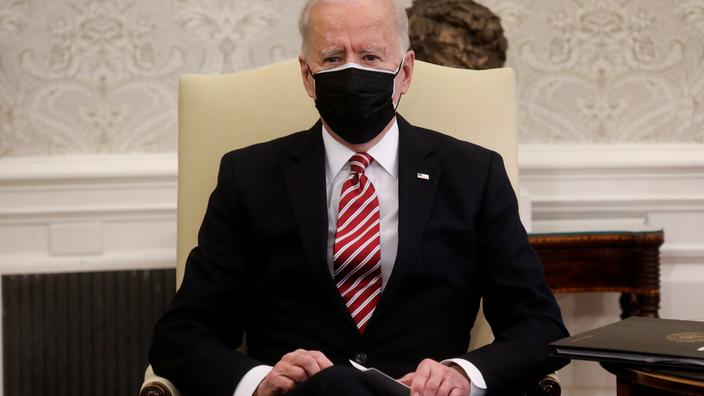A month after coming to power on the promise of American diplomacy at odds with that of Donald Trump, Joe Biden participates on Friday February 19 in his first virtual meeting with his G7 allies, focused on the response to the pandemic and especially the sharing of vaccines.
The meeting scheduled for the afternoon between the leaders of the United States, France, the United Kingdom, Germany, Italy, Japan, in the presence of the heads of the European Union, will be led by British Prime Minister Boris Johnson.
London has taken over the group's rotating presidency and plans to host a summit of its leaders in a Cornish seaside resort in June.
Read also: The week Biden 'erased' Trump's legacy
This exchange is the first since April 2020, the health situation having led to the cancellation of the summit that Donald Trump was to host.
Meanwhile, the arrival at the White House of his Democratic successor has ended four years of forced unilateralism, with Washington signaling his return to multilateral organizations like the Paris Climate Agreement and the World Organization. Health (WHO).
Over the course of his first phone calls and speeches, Biden outlined the main lines of the evolution of American diplomacy: harsher discourse against Vladimir Putin's Russia, distancing from Saudi Arabia, the desire to return to the country. Iran nuclear deal, and affection for battered allies.
A sign of a desire to repair transatlantic relations, the American president is also due to speak on Friday afternoon, with Boris Johnson and Angela Merkel, at the Munich Security Conference, a first for an American president at this annual event bringing together heads of state, diplomats and security specialists.
During the G7 call, the Democrat intends to
"focus on the international response to the Covid pandemic, including the coordination of the production, distribution and deliveries of vaccines,"
the White House said in a statement.
Macron's call for Africa
German Chancellor Angela Merkel would like to see
“the G7 take more responsibility”
regarding the response to the pandemic, according to her spokesperson.
It must in particular be question of the UN Covax system, founded by several international organizations, including the WHO, and which Washington has promised to join.
Joe Biden will also promise Friday, during this G7 meeting, four billion dollars for the Covax device, the White House said Thursday.
If the great powers have started massive vaccination campaigns against Covid-19, with varying success, concern is mounting about disadvantaged countries.
On the eve of the G7 meeting, French President Emmanuel Macron, deeming
"unsustainable"
that poor countries be neglected, pleaded in the Financial Times for rich countries to send 3% to 5% of their available doses to the Africa
"very quickly, and that people see them arriving on the ground."
"This does not slow down a day"
the western vaccine strategy, he assured.
He warned of a
"war of influence" for
lack of action, citing China and Russia.
Boris Johnson, who can boast of the success of his vaccination campaign, has already promised to redistribute most of his surplus through Covax.
Beyond the Covid-19 disease, the British leader intends to advocate for strengthened health cooperation, to reduce to one hundred days the time necessary for the development of vaccines against new diseases.
Read also: United States: Joe Biden completely breaks with Trump's diplomacy
Joe Biden also wants to take advantage of the meeting to reaffirm the priority given by his administration to the climate issue.
On the other hand, no break with Donald Trump concerning China (which is not part of the G7), towards which Washington maintains a firm position.
The American president wants to plead Friday to
"update the international rules to answer the economic challenges as posed by China",
at a time when the European Union is criticized for having signed a controversial economic agreement with Beijing.
There will be no shortage of other subjects for the leaders of the great powers, between Iran, the coup d'état in Burma and the imprisonment of Russian opponent Navalny, strongly condemned at the end of January by a statement from the heads of G7 diplomacy. .








